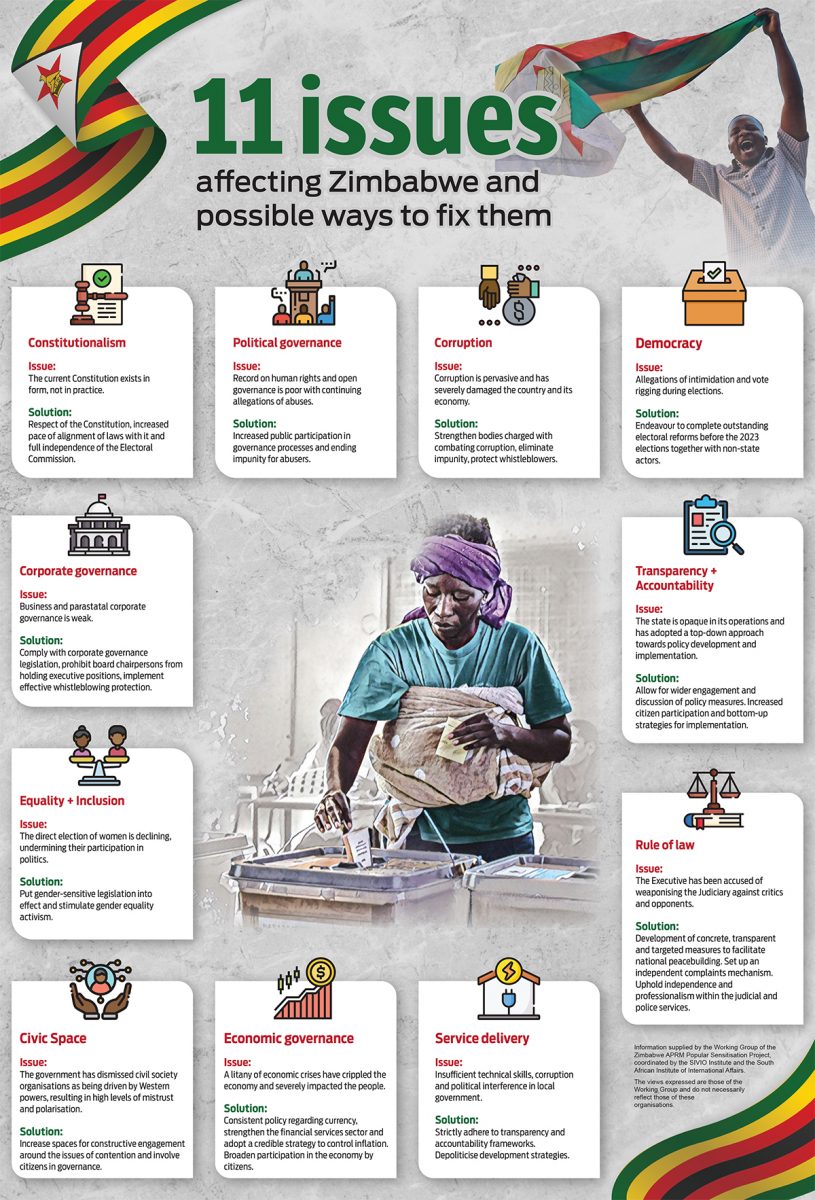The APRM, established in 2003, is Africa’s premier governance self-assessment and promotion tool. The purpose of the APRM is “to foster the adoption of policies, standards and practices that lead to political stability, high economic growth, sustainable development and accelerated sub-regional and continental economic integration through reinforcement of best practices, including identifying deficiencies and accessing the needs for capacity building,” according to its founding documents. In February 2020, Zimbabwe became the 39th African Union member state to voluntarily accede to the APRM. This accession signalled President Emmerson Mnangagwa’s commitment to open governance, reduce corruption and promote the rule of law in Zimbabwe.
The APRM’s rules require that civil society be meaningfully involved in each country’s review process. Together with government and the private sector. The country’s civil society will diagnose governance strengths and weaknesses and develop appropriate and applicable remedies.
This project is being implemented by the South African Institute of International Affairs (SAIIA) in Johannesburg, South Africa in partnership with SIVIO Institute in Harare, Zimbabwe.
Potential benefits of the APRM in Zimbabwe
The APRM can catalyse and bolster reform efforts, and open civic space for civil society organisations (CSOs) and citizens through the dialogue it promotes. It is also an opportunity for Zimbabwe to showcase its best practices to its peers. A well-run, inclusive and transparent process can promote accountability in the country, and potentially attract investors and development assistance. This African-owned process will produce a comprehensive governance assessment of Zimbabwe’s strengths and weaknesses and develop recommendations to remedy shortcomings, particularly as the country grapples with a global pandemic that will be felt for years.
Zimbabwe’s accession provides CSOs with an important opportunity. Government’s plans for the process have not yet solidified, so there is an opening for civil society to influence them. The APRM also provides a platform to promote a wide range of governance issues that CSOs feel passionately about, through evidence-based submissions. While It is a requirement that civil society be involved in a country’s APRM process, the extent of their involvement is up to the CSOs, depending on how informed, interested and mobilised they are.
The process so far
- On 29 January 2021, SAIIA and SIVIO Institute convened an online pre-planning meeting to introduce the project and develop a roadmap alongside CSOs in Zimbabwe.
- Download the presentations: Introduction to the APRM and the Zimbabwe APRM Popular Sensitisation Project (ZAPS)
- Watch the recording of the pre-planning meeting on 29 January 2021
- On 26 February 2021, a Sensitisation Workshop was held online:
- On 8 July 2021, a validation workshop was held online via Zoom:
- The Validation Workshop Report
- Constitutionalism in Zimbabwe by Greg Linington
- Rule Of Law, Militarisation Of Politics, Organised Violence by Fortune Kuhudzehwe
- Democracy and Elections by MacDonald Munyoro
- Corruption in Zimbabwe by Stephen Ndoma
- Accountability and transparency by Jonathan Kugarakuripi and Simangele Moyo-Nyede
- Shrinking civic space by Yassin Nhara
- Public Goods, Service Delivery and Citizen Welfare by GRRAT: C Selipiwe
- Corporate governance: The case of parastatals by Patrick Mpedzisi
- Watch the Launch of the Zimbabwe Civil Society APRM Submission.
Find out how similar projects have unfolded in South Africa, Botswana and Namibia.
Watch a video about the process
View the infographic

Useful links
- The South African Institute of International Affairs (SAIIA)
- SIVIO Institute
- The APRM Secretariat
- The APRM Toolkit – an online repository of APRM official documents and academic analysis
- Mastering the APRM: Creating Your Submission
- Monitoring APRM Implementation: A Civil Society How-To-Guide
- APRM: Lessons from the Pioneers
- How Zimbabwe Can Successfully Reintegrate Into the International Community
- A short guide on the APRM, written for Namibia, but applicable to all new countries joining the APRM
- A 2019 article makes the case for why Zimbabwe should join the APRM
- Handbook for African Civil Society (June 2008)
- Read the Opinion & Analysis: Zimbabwean civil society organisations identify critical issues for country’s APRM process
Download the report: Civil society submission to the APRM in Zimbabwe
See how a similar process unfolded in South Africa and Botswana
The project partners would like to thank the Government of Sweden and the Swedish International Development Cooperation Agency (SIDA) for their generous support.




